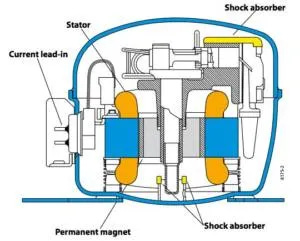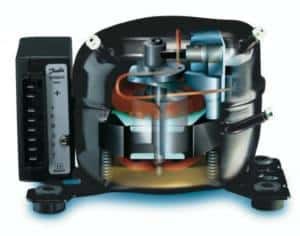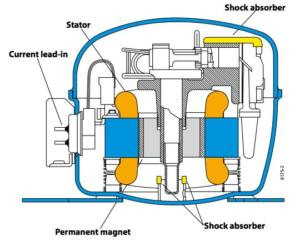Could there be a Danfoss compressor in your next RV refrigerator?
A while ago I posted my first report on how a Vitrifrigo Danfoss BD series compressor refrigerator and a Briter Products 100 amp-hour lithium battery run over 36 hours on a single charge, more than tripling the time that a residential refrigerator could run on the same battery with a inverter. So what exactly is a Danfoss compressor and what makes it a better technology for RV refrigerators?
Glad you asked
Basically these latest generation RV refrigerators use a 12-volt DC Danfoss BD compressor that includes a built-in variable speed controller and load sensor. So instead of the compressor simply being on or off (like the 120-volt compressor in your residential refrigerator) it slowly comes up to speed and provides just enough compression of the coolant to keep your refrigerator at the proper temperature. That means there’s a lot less temperature cycling.
No inverter required
Also, because it’s direct drive from 12-volts DC, you don’t need to add an inverter to step up the 12-volts DC from your battery and convert it up to the 120-volts AC of your residential refrigerator. There’s simply a lot of unavoidable losses in any inverter, so why waste power. If your appliance can use 12-volts DC, then that’s what you should be powering it with.
In my Vitrifrigo experiments last year I noticed that most of the time the refrigerator was only drawing around 60 watts from the Lithium Battery, which was 4 to 5 amperes of current at 12-volts DC. Compare this to a traditional compressor residential refrigerator that might draw 3 or 4 amps at 120-volts AC.
Inverters have a lot of losses
As I’ve noted before, your inverter will require 10 times the amount of amperage on the 12-volts DC side compared to the 120-volt AC side. That works out to 30 or 40 amperes of DC current your battery needs to supply to the inverter so it can make the 3 or 4 amperes of 120-volt AC current needed by a residential refrigerator.
It’s what’s inside that counts
I think that simply installing a residential refrigerator in an RV that needs 120-volts AC, even one of the “RV Ready” residential refrigerators that include a built-in inverter, is a poor choice in terms of battery power management. Plus, residential refrigerators were never designed to be able to absorb the shocks and vibration of your RV traveling down the road.
Danfoss has decades of manufacturing experience in the marine industry, and those boats take even more of a pounding than your RV does rolling down the highway. That’s why their DC compressors include internal shock absorbers.
The bottom line is that a refrigerator designed for the marine industry which includes a Danfoss BD series compressor that uses native 12-volt DC power will run from your RV batteries 2 to 3 times longer than a residential refrigerator with an inverter and conventional 120-volt AC compressor.
And that’s what makes boondocking with an electric refrigerator feasible with a reasonable amount solar and battery power.
Let’s play safe out there - Mike







Excellent, helpful article, Mike- thanks!
When will we see a Danfoss compressor in a rooftop AC unit?